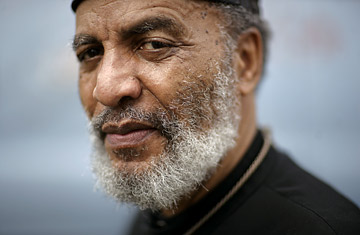
James Bevel and James Orange spent April 4, 1968 at Clayburn Temple Church organizing young people.
The duo wanted to be sure that young people knew how they could be most effective during protests because they had been blamed for strike-related violence previously. After a day of organizing workshops, the two men drove back to the Lorraine Motel to join King and his other aides.
Orange and Bevel pulled into the parking lot, excited with the news they had to report to King.
"I was coming in to tell King about the enthusiasm and the clarity in the young people, in terms of their non-hostility — and they could think things through. We had about a couple hundred young people," Bevel says. They were all in a playful mood. The feeling among all the civil rights workers had been light all day long.
"James Orange was a great big guy, so James had picked me up and was holding me up over his head and Dr. King said, 'Don't hurt him, James.' We'd had a good meeting, good workshop with the young people. So we were in a playful mood." (Orange died in February.)
Bevel got ready to tell King about what they had experienced and then he heard a shot. He ducked for cover, as did everyone else in the Lorraine parking lot. "I thought the guy was going to keep shooting," he explained. "I took the position that if they shoot King, they know that we're coming after them. I wouldn't shoot a guy like that — if I was going to shoot a guy I would have to get his whole cabinet."
But the shooting stopped with the single blast. When Bevel got up, he darted to the stairs, but the Memphis police had already gotten there. Strangely, he said, an entire group of officers rushed over and blocked the entrance to the staircase.
"To me, that was abnormal...unless they had it pre-planned. I could see a policeman coming around, but these guys came around like a platoon of policemen in a formation. I mean, instantaneously," he says.
They threatened Bevel and the others with arrest, but he said they stood strong and the officers moved on.
The whole incident continues to frustrate Bevel. What vexes Bevel is the aftermath of the murder. "I think the big mess was not that King got killed, the big mess is that we didn't make sure that the man who was accused of killing him got his day in court. That was the breakdown of the movement," Bevel says. "So King getting killed didn't break the movement down — that had very little effect on the movement. But the fact that we didn't insist that the man that was accused got his day in court, that summarily ended the non-violent movement."
Ultimately, Bevel believes King's place was in Memphis that night, even if it did mean it was his demise. To Bevel, it was all part of the struggle. He explains, "If you're at war, you can't take your armor off. Like Paul said: "Put on the whole armor of God. You can't go to battle with your armor unfastened because sooner or later you're going to pick up an arrow from somewhere.'"
With Reporting by David Von Drehle